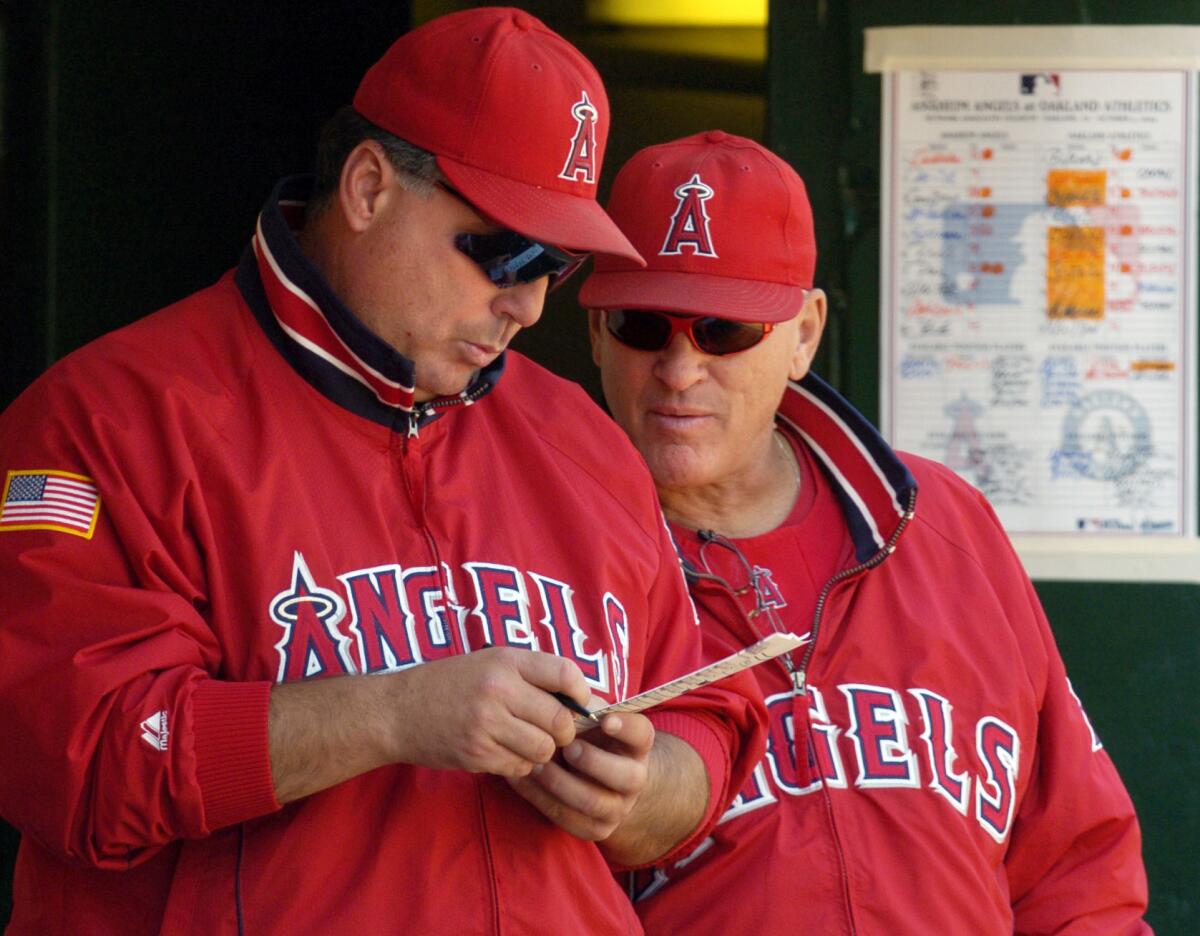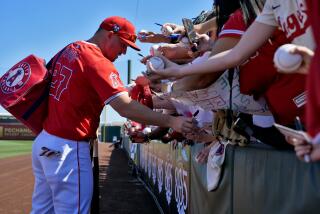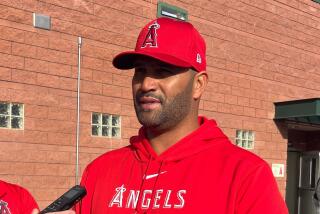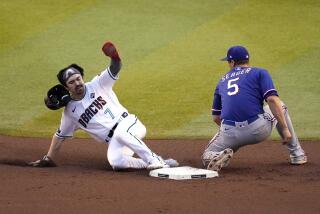Mike Scioscia’s influence is felt across the majors as his 19-year leadership of the Angels come to a close
Imitation is the sincerest form of flattery, which is why, on a gloomy February morning in 2017, a 1,600-pound longhorn Watusi steer stood outside the weight room at the Colorado Rockies’ spring-training complex in Scottsdale, Ariz.
Colorado manager Bud Black was not using the massive animal to stress the importance of grabbing a bull by the horns.
It was an over-the-top prop secured by a trio of young pitchers for a report on Rockies owners Charles and Richard Monfort, who made their fortune in the meatpacking business, and another in a line of team-building exercises that could be traced directly to Angels manager Mike Scioscia.
“Yeah, I’ll be the first to admit I copied that stuff,” said Black, in his second year with the Rockies after managing the San Diego Padres for 8 ½ years, from 2007-15. “I’m glad he didn’t have a patent on it.”
Black spent seven years (2000-06) as the Angels pitching coach under Scioscia, who is expected to step down after this season, his 19th with the Angels. Black is one of three coaches from Scioscia’s original staff who became big league managers.
The others were bench coach Joe Maddon, who managed the Tampa Bay Rays for nine years (2006-14) and is in his fourth season with the Chicago Cubs, and third-base coach Ron Roenicke, who spent four-plus seasons (2011-15) managing the Milwaukee Brewers and is now Boston’s bench coach.
Roenicke and Black were hired from the outside, along with first-base coach Alfredo Griffin, who has spent all 19 years with Scioscia in Anaheim, hitting coach Mickey Hatcher and bullpen coach Bobby Ramos. Maddon was retained from the staff of Terry Collins, who resigned as Angels manager in 1999.
Scioscia’s coaching tree also extends to the Division I college ranks—former closer Troy Percival, who got the last out of the 2002 World Series, is in his fifth year at UC Riverside, and former center fielder Darin Erstad, who caught the last out in that championship season, is in his eighth year at Nebraska.
“That shows he’s really intelligent and really good at what he does,” Detroit Tigers manager Ron Gardenhire said during an August visit to Anaheim. “Catchers, they say, make good managers because they’re into a lot of parts of the game. You also surround yourself with really good people, and he knows how to do that.”
Scioscia’s original staff remained intact for six years and poured the foundation for a prolific eight-year run in which the Angels won their only World Series championship in 2002 and five American League West titles from 2004-09.

Scioscia set the tone in his first spring with daily morning meetings designed to improve camaraderie and chemistry, often giving players off-the-field assignments and having them report back to the entire team and coaching staff.
The laughter was usually loud enough to penetrate the steel clubhouse doors and reverberate through the halls of Tempe Diablo Stadium.
One of the most memorable meetings was in 2000, when pitchers Jarrod Washburn and Scott Schoeneweis commandeered an ostrich from a nearby festival and brought it into the clubhouse.
Fellow pitcher Ramon Ortiz was so terrified of the creature that the Dominican right-hander leapt into his locker screaming, “Pollo grande! Pollo grande!”
Maddon used similar tactics in Tampa Bay and Chicago. He once drove a souped-up van—with Earth, Wind & Fire’s “Shining Star” blaring from the speakers — onto the agility field before morning stretch, with Cubs strength coach Tim Buss popping out of the vehicle dressed in a clown outfit.
After the Padres traded for Casey Kelly, a pitcher who could have played quarterback at Tennessee, in 2012, Black held a football competition with passing drills for every player who had been a high school quarterback.
“It was for guys to get to know me and for me to get to know the guys,” Black said. “Spring training is more of a relaxed setting. It’s a good time to bring guys together. I always thought it was a great exercise.”
Scioscia’s influence on Black, Maddon and Roenicke was not limited to spring-training high jinks. It could be seen in the trio’s style of managing and the way their teams played.
“For me, it was fearlessness,” Maddon said. “From the dugout, Sosh never worried about what was going to be said afterwards. He just did what he thought was right in the moment. That was one thing he really impressed upon me. He never said it, but I just watched it all the time.”
Black, Roenicke and Maddon urged their players to be aggressive on the bases without fear of getting thrown out, go from first to third on singles, advance runners with outs, the situational-hitting staples that were hallmarks of Scioscia’s most successful Angels teams.
“We walked into a bunch of good players [in Anaheim], but the thing that I feel changed the team the most was Mike’s aggressive style of play,” said Roenicke, a former big-league outfielder. “That really worked, so I tried to do that when I managed.
“Mike allowed guys to feel free to steal bases, to go first to third, to be aggressive and not worry about mistakes. I know personally, when I played, I was at times worried about making a mistake and having the coach or manager mad at you.”
One of Scioscia’s nicknames is “El Jefe,” the boss, and he was clearly in charge of the Angels for nearly two decades, the guy who made the final decisions on lineups, pitching changes and game strategy. But Scioscia did not rule with an iron fist.
“Sosh has always been open in meetings,” Maddon said. “He wanted us all to talk, and he supported us. He wanted me to show up and act as if I was going to manage the game that day so I could really express what I thought, without any recourse, and I always appreciated that about him.”
Coaches felt a sense of empowerment under Scioscia.
“I always felt like he trusted me,” Black said. “If a pitcher was faltering, he’d say, ‘Hey, Buddy, whattaya got here?’ And I’d say, ‘Mike, he’s done,’ and he’d make the decision. Or he’d say, ‘Buddy, get [Ben] Weber up,’ and I’d go, ‘Mike, you sure you want Web? You might want to go with [Brendan] Donnelly.’ It was always collaborative.”
Black spent 15 years as a big-league pitcher. He said virtually everything he learned after his playing career, from the pitcher-catcher relationship to team defense, cut-offs and relays, bunt defense, spring-training regimens and team-building exercises, came from Scioscia and the coaches on that first Angels staff.
If there was one thing Black tried to emulate most, it was Scioscia’s presence.
“I think the thing that stood out to me was his sturdiness, how steady and consistent he was, his every-day, broad-shoulders, taking on responsibility and being steadfast in what he believed in and the players he believed in,” Black said. “That’s something that I’ve tried to bring to my position for 11 years.”
Twitter: @MikeDiGiovanna
More to Read
Go beyond the scoreboard
Get the latest on L.A.'s teams in the daily Sports Report newsletter.
You may occasionally receive promotional content from the Los Angeles Times.







